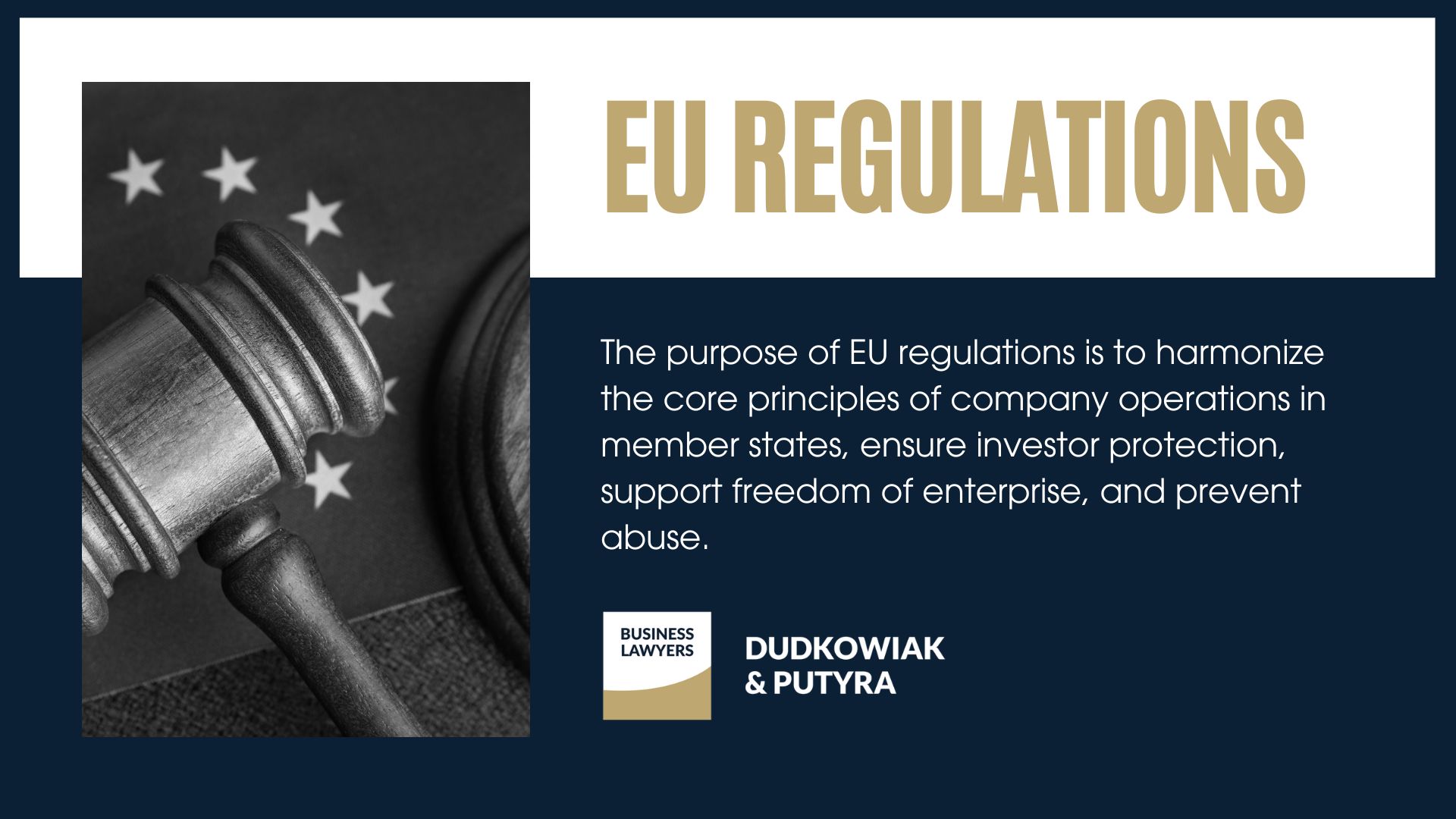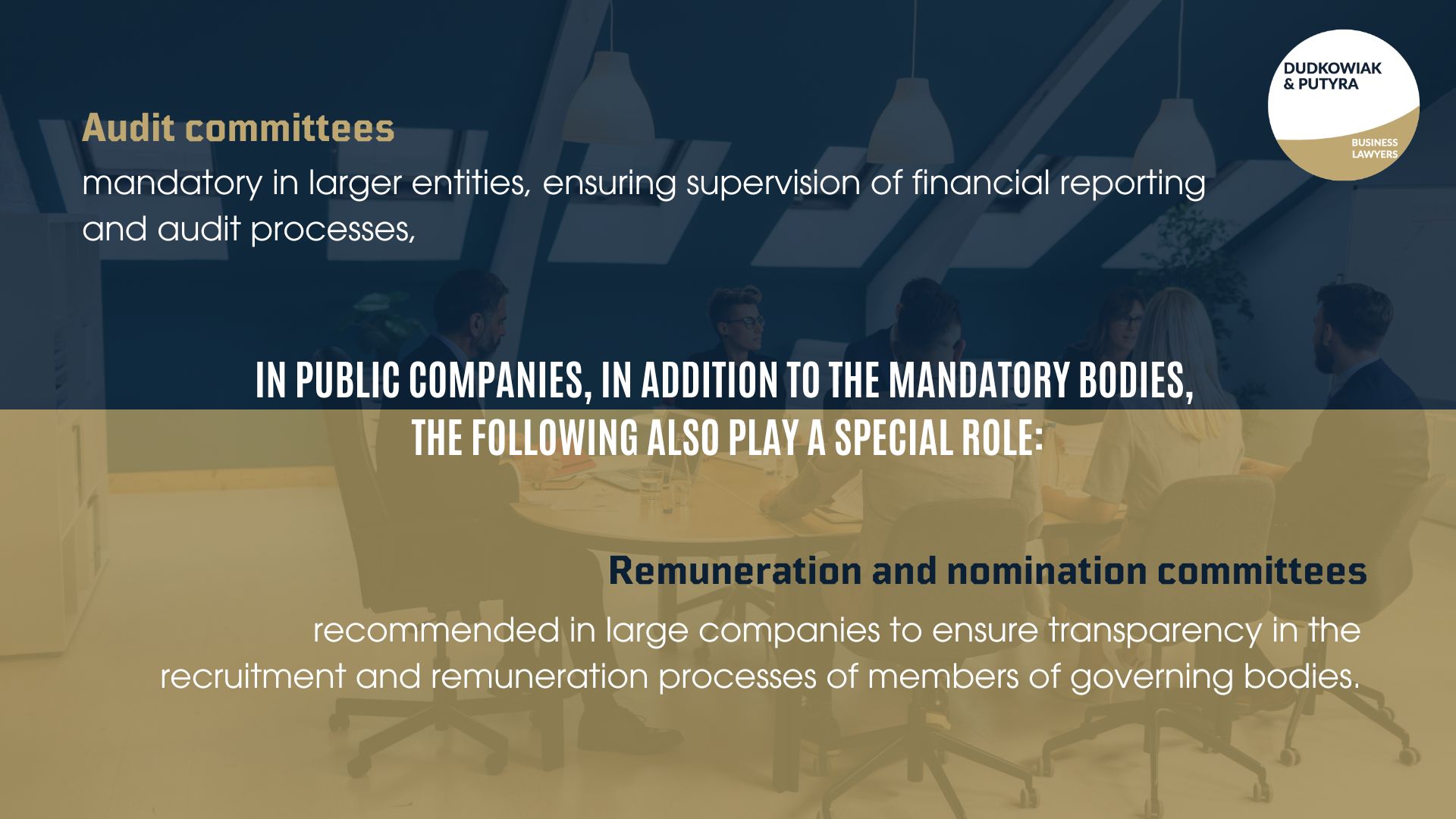Last updated: 10.11.2025

Corporate governance law in Poland
Corporate governance refers to a set of rules governing relations between a company’s governing bodies, its owners, and other entities, such as company’s employees, creditors, and investors. The purpose of corporate governance is to ensure financial transparency, effective management, ethical behavior, and the building of stakeholder trust.
Corporate governance framework
Neither the European Union nor Poland has a single source of Polish corporate governance law. For this reason, when establishing and managing a company in Poland, numerous regulatory requirements must be taken into account – both European and national law.
In Poland, the framework for strong corporate governance is set by legal provisions and the principles of good market practice. In particular, the following apply here:
- Commercial Companies Code (KSH)
- Accounting Act
- Act on Public Offering, Conditions Governing the Introduction of Financial Instruments to Organized Trading, and Public Companies
- Act on Trading in Financial Instruments
- Act on Statutory Auditors, Audit Firms and Public Oversight
- Code of Best Practice for Companies Listed on the Stock Exchange (updated Code of 2021)
- Act on the National Court Register
At the EU level, issues related to corporate law are regulated, among others, in the following legal acts:
- Directive (EU) 2017/1132 of the European Parliament and of the Council, which includes, among other things:
- Establishment of capital companies
- Requirements for share capital
- Reporting and clear and timely disclosure,
- Mergers and divisions of companies
- Directive 2004/25/EC on takeover bids, which regulates takeovers of public companies, including disclosure requirements and the protection of minority shareholders
- Directive 2007/36/EC (amended by 2017/828) – the so-called Shareholder Rights Directive, which concerns the rights of shareholders of listed companies, including voting at general meetings and remuneration policies for management bodies
- Directive 2019/1151 – digitization of companies, which allows for the online establishment of limited liability companies and the electronic submission of documents
- Council Regulation (EC) No. 2157/2001, which allows for the creation of so-called European companies that can operate across borders within the EU.
It should be remembered that the purpose of EU regulations is to harmonize the core principles of company operations in member states, ensure investor protection, support freedom of enterprise, and prevent abuse.

Basic principles of corporate governance in Poland
Although Polish law provides for six different forms of companies (four partnerships and two capital companies), corporate governance focuses mainly on capital companies:
- Limited liability companies (spółka z ograniczoną odpowiedzialnością)
- Joint-stock companies (spółka akcyjna)
For this reason, this article will only discuss the rules applicable to the above types of companies.
Structure of corporate bodies in company’s corporate governance
In the Polish legal system, the dominant model of management in capital companies is the dualistic model, which assumes the existence of two separate bodies:
- Management Board, which manages the company’s affairs, defines the business strategy, and represents it externally,
- Shareholders’ Meeting (in the case of an LLC) or the General Meeting of Shareholders (in the case of a JSC), which makes decisions on matters of key importance to the company, e.g. approves the company’s annual financial statements, grants discharge, and approves the sale/purchase of real estate or enterprises. The articles of association or statutes may extend the powers of this body.
In addition, joint-stock companies are required to establish a Supervisory Board, which supervises the company’s activities in all areas of its operations.
In practice, therefore, the role of the Supervisory Board focuses on supervising the management board of a joint-stock company.
As a rule, it is the Supervisory Board that appoints the management board. In turn, the members of the Supervisory Board are appointed by the General Meeting of Shareholders (unless the articles of association provide otherwise and transfer this power to individual shareholders, for example).
In a limited liability company, the establishment of a Supervisory Board is not mandatory, unless the share capital exceeds PLN 500,000 and the company has more than 25 shareholders.
In public companies, in addition to the mandatory bodies, the following also play a special role:
- Audit committees – mandatory in larger entities, ensuring supervision of financial reporting and audit processes,
- Remuneration and nomination committees – recommended in large companies to ensure transparency in the recruitment and remuneration processes of members of governing bodies.

Liability
In capital companies, it is mainly members of management and supervisory boards who bear civil liability towards the company for damage caused to it as a result of actions or omissions contrary to the law or the articles of association.
Liability of management board members
The liability of management board members in a limited liability company and a joint-stock company in Poland is similar.
In a limited liability company and a joint-stock company, management board members are primarily liable for damage caused to the company by actions contrary to the law or the articles of association.
Importantly, in a limited liability company, members of the management board also bear personal liability for the company’s debts towards creditors if enforcement against the company proves ineffective (Article 299 of the Commercial Companies Code).
In a joint-stock company, unlike in a limited liability company, the management board is not directly liable for the company’s obligations towards creditors – here, civil liability is internal (towards the company, not creditors).

Liability of supervisory board members
As with members of the management board, members of the supervisory board are liable for damage caused by culpable acts or omissions contrary to the law or the provisions of the agreement or the articles of association.
In the case of public companies, members of the supervisory board are also responsible for failing to supervise compliance with corporate governance rules and for breaches of disclosure or audit supervision obligations.
Both members of the management board and members of the supervisory board may additionally be held criminally liable, e.g. for improper maintenance of the company’s financial records.
| Scope of liability | Supervisory board | Management board |
| Liability to the company | Yes, based on culpability | Yes, based on culpability |
| Liability to creditors | Rarely, in exceptional cases | Yes, direct (in the case of a limited liability company) |
| Criminal liability | Possible | Possible |
| Responsibility for financial documents | Yes (e.g. approval of financial statements) | Yes(e.g. preparing and signing financial statements) |
Liability of shareholders
As a rule, shareholders in a limited liability company or stockholders in a joint-stock company are not liable for the company’s obligations. There are two exceptions to this rule:
¾ Liability of shareholders in companies „in the process of formation”
From the moment the company is formed (i.e. from the moment the articles of association or statutes are signed) until the company is entered in the National Court Register, the shareholders in the company in organization are jointly and severally liable with the company for the company’s obligations up to the amount of unpaid contributions specified in the articles of association or statutes.
¾ Liability of the dominant company
In a formalized group of companies, the dominant company may (after meeting certain other conditions) issue instructions to its subsidiaries. As a result, the dominant company may be liable to the subsidiary for damage that occurs as a result of the subsidiary’s execution of such instructions.
Corporate principles in Poland

Corporate principles is a set of rules, standards, and practices that define how companies are managed and supervised. Below are the most important ones:
Transparency and reporting
Companies should maintain transparency in their financial management and disclose risks or events that may be relevant to their partners or other market participants.
This principle is reflected, among other things, in the obligation to submit financial statements or management reports on the company’s activities electronically to a government system (Financial Document Repository), which is publicly available.
Protection of shareholders’ rights
The system should ensure equal participation of shareholders in decision-making and protect them from abuse by majority owners or management. Therefore, Polish law provides for procedures to protect minority shareholders, ensuring them, among other things:
- ¾ the right to request the convening of a general meeting or a shareholders’ meeting,
- ¾ the right to request a review or audit of specific activities of the company (so-called extraordinary review),
- ¾ the possibility of bringing an action for damages caused to the company (actio pro socio).
Independence of supervision
In order to properly implement corporate governance, companies should ensure that supervisory bodies function independently and effectively. It is desirable that supervisory boards include independent persons who are not affiliated with other bodies (management or shareholders’ meeting).
The forming of internal committees whose members have the appropriate qualifications also strengthens the effectiveness of supervision and may improve the efficiency of the management board.
Risk management and internal control
Companies should have a system for identifying, monitoring, and mitigating risks. For this reason, companies are increasingly implementing compliance or ESG procedures, as well as information security controls.
Ethics and social responsibility
Currently, CSR (Corporate Social Responsibility) issues are among the most important aspects of ethical business practices. This strategy is based on the assumption that companies do not focus solely on profits, but also take into account the impact of their activities on society, the environment and stakeholders.
CSR covers three main areas:
- environmental responsibility (e.g., reducing emissions or minimizing waste),
- employee care (e.g., equal treatment, safety at work),
- and social interests (e.g., supporting local communities).
Corporate governance in public companies
Corporate governance in public companies in Poland is regulated not only by generally applicable laws (the Act on Public Offering or the Commercial Companies Code), but also by so-called soft law, i.e. a set of good practices.
Companies listed on the Warsaw Stock Exchange are also required to apply the document “Good Practices of Companies Listed on the WSE 2021,” developed by the WSE. Good Practices of Listed Companies 2021 include:
- corporate governance principles,
- transparency requirements for remuneration,
- information policy and communication with investors,
- recommendations for the organization of general meetings,
- criteria for the independence of supervisory board members;
Public companies are required to publish a range of information, including current and periodic reports and a report on the application of Good Practices. They are also required to apply the principles of the “comply or explain” rule – if a company does not comply with certain good practices, it should explain the reasons for the deviations.

The Act on Statutory Auditors, Audit Firms and Public Oversight is also important for corporate governance in public companies. This act concerns the audit of financial statements and establishes mechanisms for supervising the quality of audits.
It also establishes the obligation to appoint an audit committee (composed of persons with appropriate competence), whose tasks include, among others, monitoring the financial reporting process and supervising the effectiveness of internal control and risk management systems.
Summary – Corporate governance practices in Poland
Corporate governance in Poland is based on solid legal foundations and market standards. However, it requires continuous development and adaptation to changing economic conditions and the expectations of investors and stakeholders.
Compliance with corporate governance principles is not only a legal obligation, but also an element of building the value and company’s reputation on the market. A well-functioning corporate governance system increases investor confidence, which in the long term has a positive impact on the company’s valuation and market position.
FAQ: Company’s corporate governance in Poland
Why is good corporate governance important for Polish companies?
Effective corporate governance ensures transparent financial reporting, enhances stakeholder trust, and supports long term value creation. By complying with Polish company law and implementing proper oversight, companies foster confidence among investors and other stakeholders.
What are the consequences of bad corporate governance?
Poor corporate governance may lead to financial irregularities, weak internal controls, loss of investor trust, and inefficient corporate governance structures, ultimately harming a company’s financial performance and market position.
How can companies protect shareholder interests and strengthen board independence?
By aligning the corporate strategy with the needs of the business, ensuring promoting ethical behavior, bringing in independent directors, and adopting practices to strengthen board independence and safeguard company’s assets.
Do governance requirements differ for private and public companies?
Yes. While private companies and a simple joint stock company follow basic rules, listed joint stock companies and public joint stock companies must ensure detailed management board’s report, publish company’s financial statements, and promote strong stakeholder engagement through their company’s board and board of directors.

